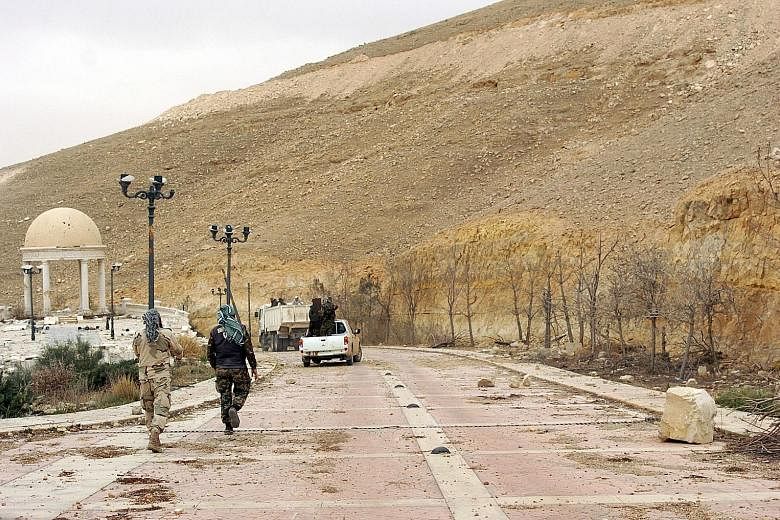DAMASCUS • The Syrian army yesterday recaptured the citadel of Palmyra from the Islamic State in Iraq and Syria (ISIS) group, nearly a year after the militants overran the ancient city, state television said, citing a military source.
"Our armed forces, in coordination with the popular defence forces, have taken control of the ancient Palmyra citadel after inflicting many losses in the ranks of the terrorist group, Daesh," the report said, using another name for ISIS.
The news came after Russian-backed Syrian forces and allied militia advanced to within several hundred metres of Palmyra's famed ruins.
The recapture of Palmyra, which the Islamist militants seized in May last year, would mark the biggest single gain for Syrian President Bashar al-Assad since Russia intervened in September and turned the tide in the five-year conflict in his favour.
Russian jets have continued to support the Syrian army and its allies as they push their offensive on the desert city, despite Moscow's recent announcement that it was withdrawing the bulk of its military forces. A Russian special forces officer was killed in combat near Palmyra in the past week, Interfax said, suggesting the Kremlin has been more deeply engaged in the Syrian conflict than it has acknowledged.
Before the citadel's recapture, Syria's Sana news agency said that the army and an allied militia took more high ground overlooking the city, while the Britain-based Syrian Observatory for Human Rights reported advances by the army amid what it said were heavy clashes.
ISIS has blown up ancient temples and tombs since capturing Palmyra, something the UN cultural agency Unesco has called a war crime. The agency had welcomed the prospect of Palmyra's recapture, saying it "carries the memory of the Syrian people, and the values of cultural diversity, tolerance and openness that have made this region a cradle of civilization".
"For one year, Palmyra has been a symbol of the cultural cleansing plaguing the Middle East," Unesco director-general Irina Bokova said.
Al-Manar, the television station of Lebanon's Hizbollah group, broadcasting live from the outskirts of Palmyra yesterday, showed footage of the ancient city.
It was not possible to assess from the long-range shots what damage had been inflicted, but colonnades and several structures appeared to be still standing.
US Secretary of State John Kerry on Thursday held talks with Russia's President Vladimir Putin and agreed to push for a political settlement in the war-torn country. "We agreed on a target schedule for establishing a framework for a political transition and also a draft constitution, and the target is August," Mr Kerry said at after the talks.
"Russia will have to speak for itself as what it's going to choose to do in order to help Mr Assad make the right decisions," Mr Kerry added.
Russian Foreign Minister Sergei Lavrov told journalists that Moscow and Washington would now step up efforts to get the Syrian regime and opposition to hold "direct talks" in Geneva.
REUTERS, AGENCE FRANCE-PRESSE

